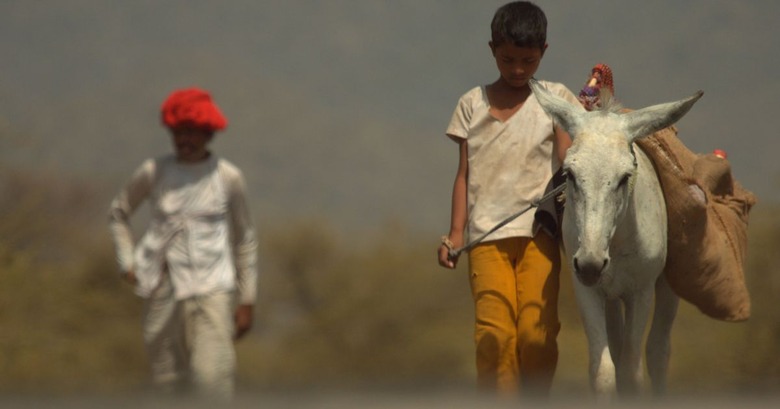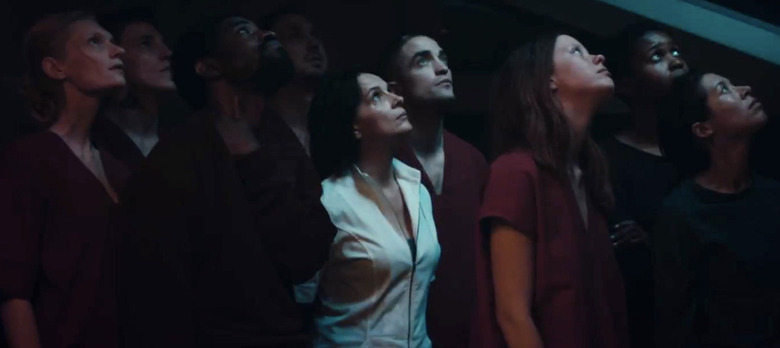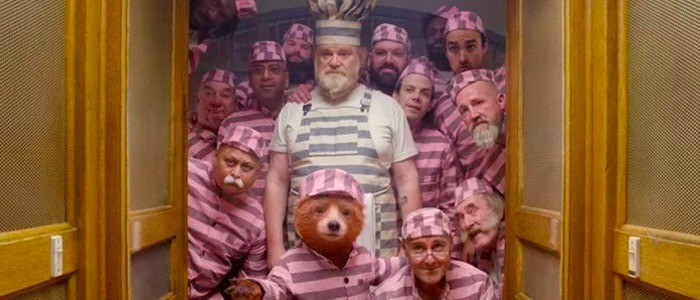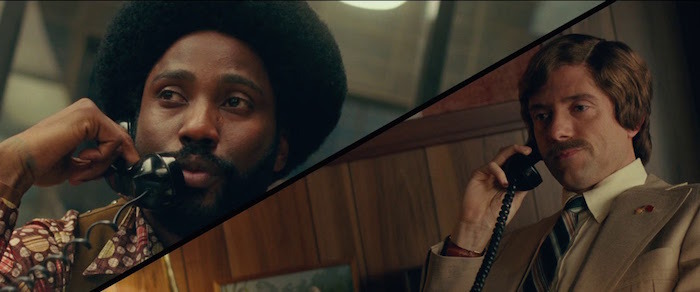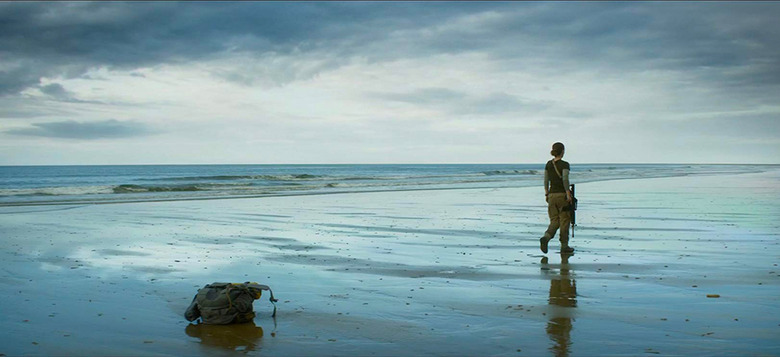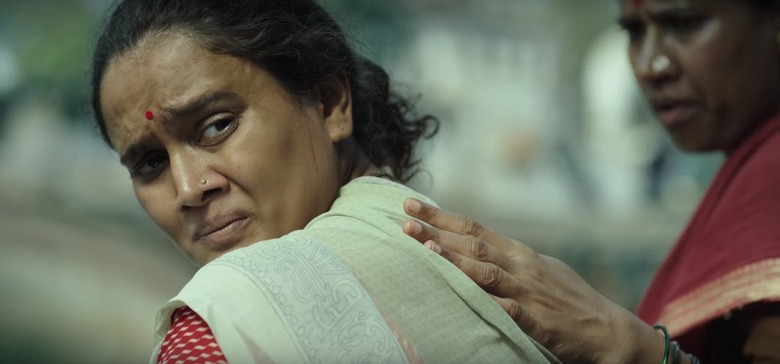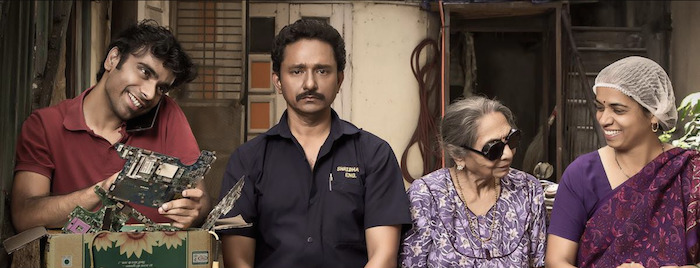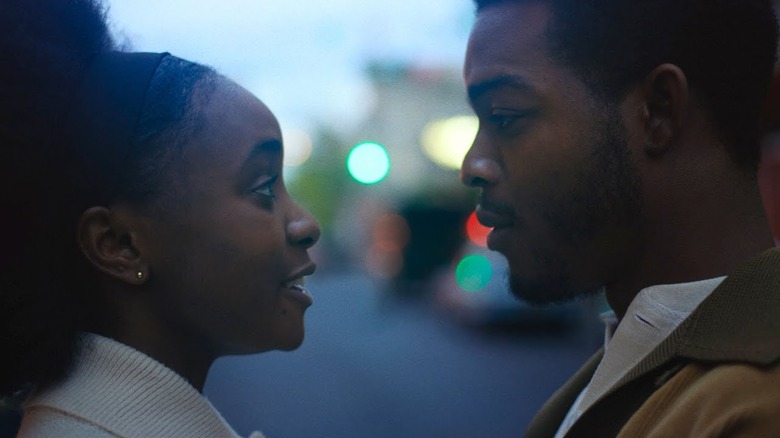The 10 Best-Directed Films Of 2018
Cinema is a language beyond words, one we speak regardless of where we're from. It allows us to both put forth and absorb ideas through picture and sound, telling stories that transcend borders while still being specific to our experiences. Though, despite our constant fixation with discussing cinema, I often wonder how much we're truly understanding one another.
Critic Matt Zoller Seitz once wrote that refusing to engage with film form is like "[refusing] to engage with the heart of a work. The heart of a film, the heart of a TV episode, might be contained in an image or a cut." He's not wrong, and the quote often pushes me to check myself whenever I talk about story as something separate from technique. The heart of a film, the heart of a TV episode, might be contained in how it's told.
Netflix's The Haunting of Hill House rightly garnered attention for "Two Storms," its sixth episode, which played out over a series of long-takes. The technical mastery in assembling the episode can't be praised enough, though what often goes un-mentioned in discussions is why presenting this way, twenty to thirty minutes at a time, was the right decision. The same plot could have easily played out over traditional coverage, but in preventing the characters from ever escaping each other's orbits, the show cranks up the inter-personal tensions that have been building all season. A perfectly medley of story and telling.
I love this time of year, when everyone makes their own unique, often deeply personal list of favourites. I've made two already, about the best works from the Asian diaspora and the year's best Indian films, but here, I found myself wanting to discuss the specific reasons I loved the things I did. It's impossible to reduce a film — a complex system of decisions, intentions and emotional responses — to a single factor, but "the heart" of these works jumped out at me in ways I won't soon forget.
I love each and every film on this list for a myriad of reasons; in trying to sum them up, however, a picture began to form. Cinema taught me a lot of things this year. About storytelling, about the world and about myself, and if I can repay the films in question by recommending them, or by discussing what they excelled at, I'll leave 2018 satisfied.
First, some honourable mentions.
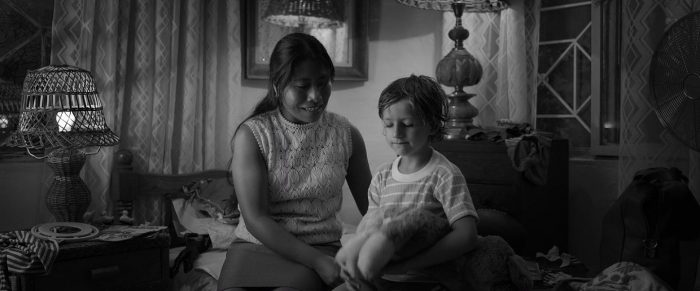
I love the editing in Roma, which tells us all we need to know about its character dynamics without a single word. I love the ornate set design of Padmaavat and how it draws you into its history. I love how Mayurakshi and Wildlife hold on their actors just a little but longer before cutting away, telling stories through reaction shots. I love how Black Panther incorporates Afrofuturist philosophy into every costume and set, creating an underlying narrative wholly separate from the action.
I love how Mid90s frames uncertainty. I love how The Favourite adjusts how seriously we take it whenever it switches lenses. I love how Her Smell snakes around winding hallways to reflect a crumbling sense of self. I love the performances in A Star is Born; drama through posture and movement is severely undervalued. I have mixed feelings on First Man, but I love how its enormous final minutes, shot on full-frame 70mm IMAX, magnify emotions on massive scale, fulfilling the film's own promise of finding new ways to see. And of course, I love everything about Into the Spider-Verse, a fitting ode to visual language in its totality.
10. Blindspotting (Carlos López Estrada)
Country: USA
Language: English
Energy.
What feels like the most slept-on film of 2018, Blindspotting is, above all else, a magnificent performance piece. Its backdrop is institutional racism, pitting Collin Hoskins (Daveed Diggs, i.e. Hamilton's original Lafayette and Jefferson) against a system of incarceration and police brutality. However, it treats both Collin's year-long probation and the police shooting he witnesses — that of an unarmed Black father — as normal occurrences. They weigh on Collin daily, interrupting his morning runs with nightmarish visions. Diggs fights opposing battles here, bringing to the surface the lasting effects of trauma while being forced to shrug them off in the very same breath, but these traumas, these major injustices, aren't the larger plot of the movie. They are, instead, the mere mechanics of Collin's life; the terms of his existence as a Black man.
Collin's best friend, fellow furniture mover Miles (Diggs' co-producer Rafael Casal) is a white man born and raised in Oakland. He speaks the slang, he knows how to read the streets, and given his surroundings — a Black best friend, a Black wife, even a Black son — he's woke, for lack of better term, and attuned to the nuances of antiblackness. He knows what photographs the press will use for the police and the victim before the shooting story breaks. On a ground level, able to walk into a Black hair salon and sell its owner used hair straighteners, a hilarious and exciting moment. He's that guy. That friend who knows what's up, using just enough AAVE to avoid mimicry (though to him, it's a native tongue) but never skirting close to any variation of N-word, even by accident, despite the moniker being thrown his way. The plot, simply put, is Collin navigating the last three days of his probation, but where it gets complicated is in the time he spends with Miles.
Miles has a violent streak, and his skirting around legality puts Collin at risk. Despite most of the film focusing on duo moving boxes, its crux is the different ways in which they navigate spaces. During any given activity, whether sitting in traffic or even walking into a convenience store, the different energies Diggs and Casal bring forth fill the frame with palpable tension. Collin, unlike Miles, isn't going to be given the benefit of doubt, and while they don't butt heads over this until late in the film, the subtle contrast in the two performances plants the seed with precision.
Casal's movements, his tone of voice, even the length of time he maintains eye contact, carry flashes self-assurance that Collin simply can't afford. Instead, Diggs remains ever so slightly more cautious. His weary eyes occasionally leave the conversation to gauge his surroundings, turning otherwise mundane scenes into explorations. While it eventually dissects racial preconceptions (leading to explosive confrontations), Blindspotting remains focused on the long-term effects of being placed in a box, which Collin and Miles express in the form of laid-back freestyle. The day-to-day struggles of being preconceived, living in a world where Black kids need pamphlets, and practice, for putting their hands up.
9. Bhasmasur (Nishil Sheth)
Country: India
Language: Hindi
Space.
Bhasmasur is a tale of tough love and innocence lost. Set in a drought-ridden village in Rajasthan, it centers on a young boy, Tipu (Mittal Chouhan), his beloved pet donkey Bhasmasur, and his father Dhaanu (Imran Rasheed), who needs to sell the animal out of desperation. As the trio embarks on an arduous city journey, Dhaanu is forced to show Tipu the ropes when it comes to survival. As a father who can't afford to be vulnerable, Dhaanu's actions are born from a complex swirl of love and anger — complicated feelings that Tipu returns in equal measure.
Nishil Sheth and D.P. Shrish Tomar explore, through Tipu and Dhaanu's eyes, the beauty and hardships of rural India, from the contours of the broken ground to the golden sunlight shimmering off its surface. After days of travel without water, and after the buildup of severe emotional tensions, the father-son duo arrives at a gorgeous oasis. They splash and bond, in a scene composed mostly of wide shots, but is uses long/telephoto lenses, flattening the image and making them part of a beautiful landscape painting. The film affords them enough room to frolic laterally, along a wide open space, coming together and separating at will.
Later however, when the two ride a Ferris wheel together, Dhaanu is on the verge of a difficult decision. A wide-angle lens captures them in close proximity, their awkward energy confined by the walls of the carriage, made to feel closer than normal. The contrast of these two scenes perfectly represents the difficulties of their relationship: a father, forced by circumstance to put his sons through an emotional ringer. Being close to someone to the point of suffocation, even someone you love, isn't healthy, but Tipu and Dhaanu don't seem to have a choice. Few people do when they're starving.
8. High-Life (Claire Denis)
Country: France, Germany, Poland, UK, USA
Language: English
Memory.
Per critic Bilge Ebiri, auteurs do some of the best work in outer space. "The vast emptiness of the cosmos," he explains, "has a way of bringing out the more experimental side of a filmmaker." This is undoubtedly true of Claire Denis and her small step into a larger world, High-Life, reflecting humanity's hopeless isolation on the brink of, or perhaps even after, annihilation. Space station prisoner Monte (Robert Pattinson), the last man onboard, and for all he knows, the last remaining human adult, spends time balancing a newborn with the responsibilities of keeping up the ship's life-support. The film cuts intermittently to months or years earlier, when the vessel — travelling away from civilization at light speed — was populat ed by a handful of other inmates (Mia Goth, Lars Eidinger, André Benjamin, Agata Buzek, Claire Tran, Gloria Obianyo), all cast off from Earth as fertility Guinea pigs for experiments by Dr. Dibbs (Juliette Binoche).
From both these points in the story, editor Guy Lecorne occasionally flashes back to an Earth that may no longer exist. We see glimpses of the characters' pasts, mostly in childhood, though who's memories we're seeing isn't always clear. Friends on trains. Dogs by the river. Petty grievances turning violent among the trees. Rural, abstract details of the lives and decisions that led them here.
These flashes aren't narratively motivated in the traditional sense — one, about the politics of dooming prisoners to the coldness of the cosmos, isn't tethered to anyone on the ship — but the presentation of these recollections gives them a tactile quality. Shot by cinematographer Yorick Le Saux on grainy 16mm film, the moving haze of memory forms a collective portrait of life as it's lived, often in the vast openness of nature — in contrast to the inmates planting fauna in the confines of a lab. As if we're seeing the living memories of the film itself.
7. Paddington 2 (Paul King)
Country: France, UK
Language: English
Effects.
Paragons of filmic decency, the Paddington movies (especially the latter) set a new bar for four-quandrant cinema. Entertaining, stunningly funny and often nakedly heartfelt, Paul King's action-comedy sequel features a who's who of British cinema in its supporting roles. From Brendan Gleeson's Nuckles McGinty, a hardened inmate softened by the culinary arts, to Hugh Grant as Phoenix Buchanan, a washed-up movie star and master of disguise (the role of a lifetime!) to... well, the list is endless. Paddington 2 hinges on a search for a pop-up book about London, which Buchanan hopes to selfishly use as a treasure map. The other side of this equation, however, is the delightful Paddington Brown, a polite bear cub voiced by Ben Whishaw, who hopes to gift the book to his aunt in lieu of her being able to visit.
Everything from the sweet, precisely melodramatic performances to the King's mile-a-minute setups and payoffs works like a charm. However, it's Paddington himself who happens to be the film's warm, marmalade-y center. Light reflects off his eyes as he takes in the world around him, like a curious child, absorbing wonder and paying it back in equal measure.
The film's computer-generated visual effects, led by the firm Framestone (you can find the individual team members here) are wonderful to the point of being cozy. Chief among them is Paddington, a largely CG character on par with any performed by Andy Serkis. Paddington's broader movements are also brought to life using occasional animatronics, but where the film truly comes to life is in the character's close ups — testament to the wonders of modern filmmaking— many of which hinge on him expressing his aunt Lucy's philosophies on kindness. Whether wide-eyed innocence, intimidating "Hard Stares," or occasionally struggling to stay the course of a fixed moral compass, Paddington feels like a living, breathing person, inhabiting the same spaces as the live-action characters, causing them to change in a multitude of ways, most often for the better. The little bear can't help but feel like an embodiment of our best selves.
6. BlacKkKlansman (Spike Lee)
Country: USA
Language: English
Tone.
It's been nearly three decades since Malcolm X and Do the Right Thing, but Spike Lee is just as focused and fiery as ever. BlacKkKlansman is a sort-of true story about a Black police officer (John David Washington) and his Jewish partner (Adam Driver) infiltrating the Klan, posing as two halves of the same white supremacist persona. Arguably Lee's best film since 25th Hour, the virtuoso re-cements himself as one of America's premiere cinematic voices. Not only does he crafts yet another ode to the beauty of blackness, he also taps into a particular cognitive dissonance plaguing modern America, a nation at times in a confused, conflicted political state, unable to get a handle on how best to approach far-right resurgence.
Spike Lee dares us to take white supremacy seriously.
It's all too easy to make light of; the film engages in the same antics one might find on Twitter, dismissing racism as a fringe ideology, indulged in exclusively by morons. Lee even casts That '70s Show mainstay Topher Grace, a comedic presence, as KKK leader David Duke, one of the many Klansmen the film presents as a rube. However, as its two Ron Stallworths go deeper undercover, BlacKkKlansman begins to pull back the curtain behind the idiocy, contrasting the Klan's mindless, mockable yeehaw-ing at D.W. Griffith's The Birth of a Nation with real-world impact — of the film, of the organization that birthed it (and many ways, was birthed by it) and on both individual and institutional levels. He skillfully cross-cuts to a more somber civil rights meeting, where young Black organizers inherit knowledge from an older activist who's seen the Klan's ugliness first hand. The Klansmen continue to behave as goofily as ever, but they begin to seem all the more dangerous.
To top it all off, even the Stallworths' minor victory is brushed aside — or rather, forced aside as official mandate — as the spectre of the Klan continues to loom. As a necessary post-script, Lee pulls us into the present with footage of the real David Duke speaking at a recent Neo Nazi march, the very same rally where Heather Hayer was killed, making real, painful and strikingly urgent all the failures of the past. It's like writing history with lightning.
5. Annihilation (Alex Garland)
Country: UK, USA
Language: English
Music.
Annihilation is science fiction at its most compelling, dropping its characters head-first into The Shimmer, an expanding alien prism that refracts their sense of self. DNA shifts and time loses all meaning, as a crew of women explorers (Natalie Portman, Gina Rodriguez, Tessa Thompson, Tuva Nuvotny, Jennifer Jason Leigh) ventures deeper into the heart of darkness, which in turn reflects back to them the parts of themselves they most fear. Death. Depression. Helplessness. Change.
Natalie Portman's Lena is driven by the return of a husband she no longer knows; Kane (Oscar Isaac) ventured into the same invading alien realm and came back a different person. Pain, regret, and all that catalyzes metamorphosis comes charging out at Lena. Upon reaching the source underneath a lighthouse, she's confronted by a glowing, kaleidoscopic being — a mystery that has no answers, since even the questions are inarticulable — and by echoes that feel, at once, from a world beyond, and from within. The works of the extensive sound and music departments blend together as one. The being begins to takes the shape of Lena herself, an almost-doppelganger who almost-mirrors her movements. The sound design begin to resemble music, repeating in almost-identical fashion.
The sounds reverberate. The characters reverberate. The story reverberates too, echoing through the characters' skin and voice and very sense of being, forcing Lena back out into the world as both herself, and as a mirror of who she once was. An echo that is, at once, something familiar, yet something alien.
4. Nude (Ravi Jadhav)
Country: India
Language: Marathi
Motion.
Yamuna turns. This is the first thing we see the character do. Even before we catch a glimpse of her face — as she stands on the river bank amongst a row of women washing clothes in unison — we're shown a closeup of her feet, shot on a wide-angle lens, making her small movements feel enormous. She spins toward the river, and toward a freedom she desperately craves, diving into the water.
Nude is a film about art. It's a film about women, too; Yamuna (Kalyanee Mulay), who turns to nude modelling at an art college to make ends meet, and her aunt (Chhaya Kadam) who passes down both the job, and the caring advice that pushes her to be comfortable in her own skin. Slowly, but with a gradual sense of self-assurance, Yamuna begins to shed the shame and self-loathing of being, instilled in her over generations.
Yamuna turns, to peek over her own shoulder, at the students who use her body to seek knowledge. As her anxieties fade she turns to new jobs, private modeling for respected professionals, who use women's posture to find their souls. She's never sexualized, but she's still placed in a complicated predicament. Her stillness brings with it a conditional existence; the men who love and respect her decide how she's frame as a person; the men who detest her and protest expression frame her as a cypher. No matter what, her freedom depends on the politics of men. The world they create— even with the best intentions — exacts a cost from women, a cost Ravi Jadhav confronts head on in his loving exploration. (Full Review)
3. The Rider (Chloé Zhao)
Country: USA
Language: English
Closeup.
Chloé Zhao is one of global cinema's vital new voices, carving out a unique niche as a Chinese filmmaker telling Native American stories. In her modern-Western follow up to Songs My Brothers Taught Me, she blends the worlds of fiction and documentary by casting former rodeo star Brady Jandreau as Brady Blackburn. The rest of his family fills in too. Both Bradys suffered debilitating head injuries that took them off the horse. Rather than getting back on the saddle, though, The Rider is about Brady dealing with the possibility that he may never ride again.
Few things are as defeating as purposelessness mounted on one's shoulder. Jandreau, a first-time actor who lived through the experiences in the film, lives through them once more. The Rider isn't so much re-enactment, though, as it is re-dramatization, staging key moments along his journey and magnifying their subtext as Brady learns to live again. He navigates a world where scars, injuries and disabilities are the norm (though never treated by the film as out of the ordinary) and while he finds bittersweet strength in the struggles of those around him, Brady's journey soon reaches its low point. After visiting his quadriplegic friend Lane, who suffered a similar accident (the kind he might suffer if he decides to keep recklessly chasing his passions), Brady drives alone in his car.
Blackburn, like Jandreau, is quiet and soft-spoken, but the frustration of his inertia pushes him over the edge in a moment of isolation. Zhao captures this moment intimately and tenderly. Brady sits at the steering wheel, driving along the prairie behind glass and steel, when he ought to be riding through it with the wind in his hair. Gradually, yet all of a sudden, everything boils over; the masculine stoicism of his addict father, the unbridled expressiveness of his disabled sister, and the expectations of those around him, all come crashing down, bursting out of him in a moment of anger and sorrow and helplessness before he's able to move on. An entire story, captured on a human face. (Full Review)
2. Lathe Joshi (Mangesh Joshi)
Country: India
Language: Marathi
Sound.
Vijay Joshi (Chittaranjan Giri) is fired from his job of 30 years. A lathe machine worker nicknamed "Lathe Joshi," his very identity is inseparable from his trade. He spent decades honing his skills only to be replaced by machines, which soullessly crank out the pistons and parts he used to craft with so much care. Rendered obsolete by progress, Vijay enters a world where technology is a marvel to most people; he can't help but see it as a global harmony that's left him in the dust.
The film's sound design, led by Piyush Shah, fills the urban landscape with a devastating duality. The whirs of the mechanical world, from cars that move people in the present to construction that plans for the future, envelop Vijay as he wanders the streets, unsure of how to tell his wife, his mother and his son — whose hi-tech kitchen, computer business and laser eye surgery make them benefactors of modernity — that he's been left behind. The soundscape reflects both the life unfolding around him, as well as the intrusion of the idea that life has no room for him, leaving him with little recourse but to sit around and wait to die.
At home, his mother's radio chants prayers on repeat, turning even the spiritual into something technical. Another aural duality; an uncanny malaise that Vijay now associates with "home." When the radio finally breaks however, failing as all machines do, the eventual silence acts as a comforting reminder that all of us, everything we are, and every thing we own, will all be outlived. As much as Lathe Joshi is about death and its inevitability, it's a reminder that we aren't quite as alone as we might think. (Full Review)
1. If Beale Street Could Talk (Barry Jenkins)
Country: USA
Language: English
Emptiness.
A film that uses negative space — devastating, ugly, empty — to explore what connects us beyond words. The forces of fear and love take center stage in If Beale Street Could Talk, Barry Jenkins' ode to James Baldwin and his soulful Moonlight follow-up. It's a masterful medley of light, sound and silence that turns ether to electricity.
For Tish (Kiki Lane) and Fonny (Stephan James), who shoulder the burden of their own lives, their families' lives, the future children's lives and weight of Black history, the emptiness between them is filled with infinite possibility. As they're about to make love for the first time, James Laxton's caring camera floats between them, their beautiful, anxious bodies framed in profile. He captures a relationship in all its entirety — two separate yet singular lives upto this point — in all that it is, and all that it ought to be. That empty space, an infinite void, becomes filled with passion.
But that emptiness can also be horrifying; it can also be us, once we've been hollowed out from within. In a later scene, Fonny's old friend Daniel (Brian Tyree Henry) warns him of the rattling experience that is American prison, a system that we, the audience, know Fonny is destined for. The camera floats, barely buoyant, on the tension between them. Where the space was once filled by Nicholas Britell's mesmerizing strings — two sets of warring melodies, like love trying to claw its way out from underneath fear — it becomes occupied entirely by Henry's haunting whispers; poems about pain, as we see him regress into a state of childlike helplessness. There is unseen horror, but real, true and immediate horror, lurking just off-screen. Just behind the prison doors through which Fonny emerges to talk to Tish through panes of glass, his face battered and bruised, his future imperiled.
But there is light, too, peeking out of every corner of the frame. There is hope and wonder in the love these characters share, and love itself being at stake makes reform all the more pressing. As Fonny and Tish, now expecting a child, begin to plan their life together, they walk through the skeleton of an unfinished apartment building, a last resort after months of rejection. They're allowed to picture, albeit momentarily, the joyful meals their families might share once the walls are complete. In a most playful depiction of tenderness, Fonny and prospective landlord Levy (Dave Franco) carry, through the imaginary doors of Tish and Fonny's imaginary apartment, an imaginary stove and refrigerator, making tangible an invisible future, filling emptiness with comfort and care.
Levy, a Jewish man, is the first to show them kindness during their search for a home. "I'm just my mother's son," he assures them, connecting the dots between centuries of oppression faced by both their people — Judaism is a matrilineal faith — as well as the love they're still capable of giving. "Sometimes that's all that makes a difference between us and them."
It is the "us" that Barry Jenkins reflects through his soul-piercing stares, characters' eyes locked into a camera that turns their faces into ones and zeros before transforming them into light, locking their eyes on ours beyond time and space and nothingness. As if drawing us toward all the beauty in the world at once, so that we may we feel, and love, more completely. (Full Review)


